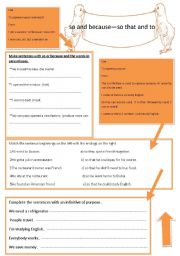
|
so and because�so that and to
1
To express reason and result.
Form:
I put a sweater on because I was cold.
I was cold, so I put a sweater on
2
To express purpose.
Form:
The to infinitive is used to express purpose. In order to can also be used.
I came to the U.S. to study English.
So that can also be used. It is often followed by could / can or would.
I came to the...
Level: intermediate
Age: 10-17
Type: worksheet
Downloads: 26
|
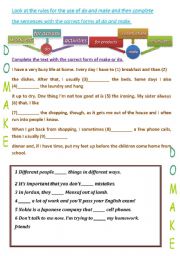
|
do--make
Look at the rules for the use of do and make and then complete
the sentences with the correct forms of do and make
Level: intermediate
Age: 14-17
Type: worksheet
Downloads: 35
|
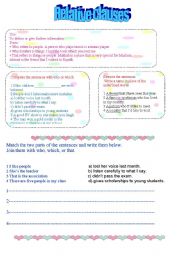
|
Relative clauses Who .. � Which . . � That
Use:
To define or give further information.
Form:
� Who refers to people. A person who plays tennis is a tennis player.
� Which refers to things. I lost the book which you lent me.
� That refers to things or people. Makkah is a place that is very special for Muslims.
Ahmad is the friend that I visited in Riyadh.
Level: intermediate
Age: 14-17
Type: worksheet
Downloads: 12
|
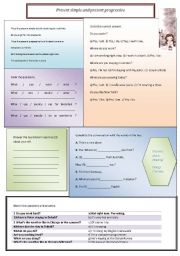
|
Present simple and present progressive
� Use the present simple to talk about regular activities.
He plays golf on the weekends.
� Use the present progressive to talk about current or
temporary activities.
He�s talking to someone on the phone right now.
I�m staying with a friend for a week.
Level: intermediate
Age: 10-17
Type: worksheet
Downloads: 5
|
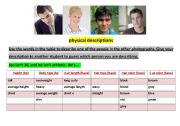
|
Physical descriptions
1-Use the words in the table to describe one of the people in the other photographs. Give your description to another student to guess which person you are describing.
2-Write a description of yourself and another person in the classroom � another student or your teacher
Level: elementary
Age: 10-17
Type: worksheet
Downloads: 15
|
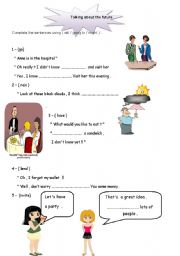
|
future
Complete the sentences using ( will / going to / might )
Level: elementary
Age: 10-17
Type: worksheet
Downloads: 2
|
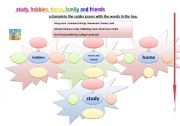
|
study, hobbies, home, family and friends
a Complete the spider grams with the words in the box.
Complete the paragraph with words from the spider grams in exercise
Level: elementary
Age: 9-17
Type: worksheet
Downloads: 4
|
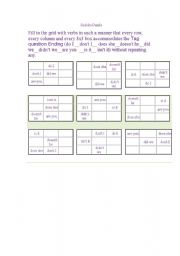
|
Sudoku Puzzle Tag question Ending
Fill in the grid with verbs in such a manner that every row, every column and every 3x3 box accommodates the Tag question Ending (do I __don�t I__ does she__doesn�t he__did we__didn�t we__are you __is it__ isn�t it) without repeating any.
Level: intermediate
Age: 14-17
Type: worksheet
Downloads: 7
|
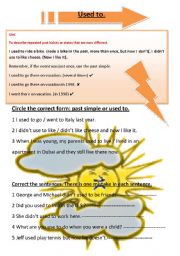
|
Used to.
To describe repeated past habits or states that are now different.
Remember, if the event was just once, use the past simple.
I used to go there on vacation. (several times) ✔
I used to go there on vacation in 1998. ✘
I went there on vacation. (in 1998) ✔
Level: intermediate
Age: 13-17
Type: worksheet
Downloads: 25
|
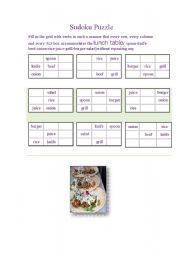
|
Game Sudoku Puzzle(lunch table )
Fill in the grid with verbs in such a manner that every row, every column and every 3x3 box accommodates the lunch table( spoon-knife-beef-onion-rice-juice-grill-burger-salad)without repeating any.
Level: elementary
Age: 10-17
Type: worksheet
Downloads: 3
|